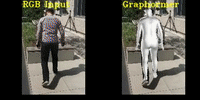MeshGraphormer
✨
✨
This is our research code of Mesh Graphormer.
Mesh Graphormer is a new transformer-based method for human pose and mesh reconsruction from an input image. In this work, we study how to combine graph convolutions and self-attentions in a transformer to better model both local and global interactions.
Installation
Check INSTALL.md for installation instructions.
Model Zoo and Download
Please download our pre-trained models and other relevant files that are important to run our code.
Check DOWNLOAD.md for details.
Quick demo
We provide demo codes to run end-to-end inference on the test images.
Check DEMO.md for details.
Experiments
We provide python codes for training and evaluation.
Check EXP.md for details.
License
Our research code is released under the MIT license. See LICENSE for details.
We use submodules from third parties, such as huggingface/transformers and hassony2/manopth. Please see NOTICE for details.
Our models have dependency with SMPL and MANO models. Please note that any use of SMPL models and MANO models are subject to Software Copyright License for non-commercial scientific research purposes. Please see SMPL-Model License and MANO License for details.
Contributing
We welcome contributions and suggestions. Please check CONTRIBUTE and CODE_OF_CONDUCT for details.
Citations
If you find our work useful in your research, please consider citing:
@inproceedings{lin2021-mesh-graphormer,
author = {Lin, Kevin and Wang, Lijuan and Liu, Zicheng},
title = {Mesh Graphormer},
booktitle = {ICCV},
year = {2021},
}
Acknowledgments
Our implementation and experiments are built on top of open-source GitHub repositories. We thank all the authors who made their code public, which tremendously accelerates our project progress. If you find these works helpful, please consider citing them as well.





